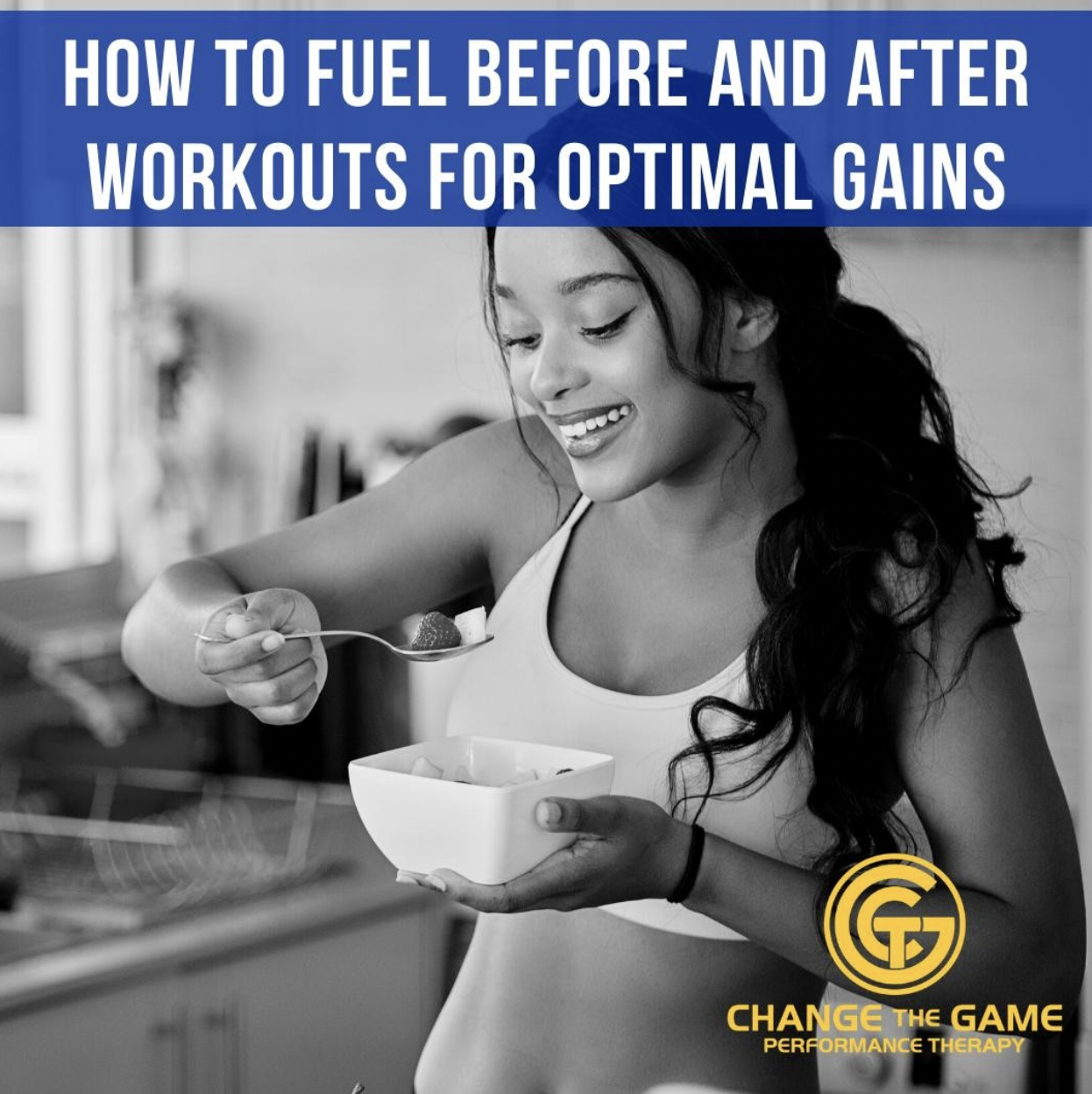How to Fuel Before and After a Workout for Optimal gains
Sara Stover for Change the Game PT
Raise your hand if you have ever counted your morning coffee as your pre-workout fuel? Or if you ate way too many tacos after your training session yesterday because you earned it… and it was Cinco de Mayo?!
Don’t despair! Coffee and tacos can have their place in your diet. But if you eat both immediately before your workout, you may not be thrilled with the results.
So what exactly should you be consuming before and after your workout for optimal gains? Read on to find out!
Fueling Before Your Workout
To achieve your fitness goals and improve your performance, your nutrition should be modified based on your workout. And it helps to understand the science behind fuel and fitness.
Muscles store glucose in the form of glycogen, drawing on these stores when we exercise. When we eat carbohydrates, those carbs break down into glucose, entering our muscle cells and delivering the fuel we need to optimize our workouts.
To ensure that you have enough glucose to restore the glycogen stores you dip into during training, make it a priority to eat some carbs ahead of time.
An athlete cannot fuel on coffee alone!
If you’re in the habit of grabbing a cup of coffee and rushing into your workout on an empty stomach, it’s time for a change. By eating little to nothing before your workout, you run the risk of becoming dizzy, too fatigued to maintain proper form, or even injuring yourself.
To get the most out of your strength training, have something to eat 30 minutes to three hours prior to exercise. This ensures that your body has sufficient time to digest your food, so those calories are available once you start working out!
The time that works best will differ from person to person, so don’t be afraid to experiment until you determine the ideal timeframe for you. Morning workouts will typically require that you eat sooner than later. And fueling for AM training sessions may come down to how little or much you can actually get down that soon after waking up!
For some quick energy in the form of carbs and protein before exercise, don’t underestimate the power of a piece of fruit with nut butter, a granola bar, rice cakes or whole-grain toast topped with nut butter, oatmeal with fruit and nuts, or Greek yogurt with granola and berries.
Consider making a dozen breakfast egg bites or oatmeal cups over the weekend for a quick breakfast. To heat them up for quick AM nutrition, microwave one while your coffee is brewing and enjoy!
Or try an easy protein-packed breakfast by adding 1 scoop of Nutrex Protein Powder to your favorite smoothie recipe and sipping it 30 minutes to an hour before you begin your workout. You can always finish whatever’s left over when you’re done training!
For you PM people, there’s no excuse for improper fueling before exercise! Aim for a nutritious meal two to three hours before your workout or a light meal or snack 30 minutes to one hour before exercise.
No matter when you work out, it’s to your advantage to eat a pre-workout snack or meal that contains both carbs and protein! Remember, carbs, healthy fats, protein, and other macronutrients are essential for building muscle, attaining the energy you need for a quality workout, and maintaining health. Being intentional about what you eat before and after a workout may mean planning ahead, but it’s worth the effort.
On the rare occasion that you find yourself strapped for time, grabbing a banana and a bottle of water is better than nothing at all. For every 15 to 30 minutes of intense physical activity or 30 to 45 minutes of moderate exercise, drink one cup of water. As we look ahead to the sweltering months of summer and the accompanying sweaty workouts, this becomes even more important, so get in the habit of drinking water now.
Post Exercise Meals
Have you noticed that you’re more productive after finishing a lunch break workout? Chances are that the workout and what you ate following your training were both at play.
Conversely, regularly depriving your body of fuel after exercising interrupts the body’s process of repairing muscle cells. If you’re feeling lethargic or weak after a standard strength-training session your glucose levels may be on the low side.
For runners or athletes, this is especially counter-productive, since consistently skipping a post-workout meal can compromise performance. If your body doesn’t have the fuel it needs, it can’t properly recover after exercise, making you more susceptible to injury and illness.
To avoid fatigue and reach your fitness goals, don’t just ingest a candy bar and call it a day! Make an effort to repair damaged muscles and replenish your depleted glycogen stores post-workout by eating complex carbs such as whole-wheat bread, brown rice, nuts, and quinoa.
And make your post-workout meal high in healthy proteins by paring your carbs with beans, nut butters, hummus, tofu, fish, or lean meat. From protein shakes and smoothies to salmon with sweet potato or an egg sandwich with avocado, a snack or meal that is built on carbs and protein is vital for muscle recovery, especially after weight training.
Hydration
And don’t forget electrolytes! To restore electrolytes in between your workouts, choose drinks high in electrolytes and low in simple sugars instead, and avoid sports drinks and mixes with high amounts of artificial and simple sugars.
A fueling plan for strength training doesn’t have to be gourmet or time-consuming if you don’t want it to be. With these tips, you can effectively fuel your workouts for the strength you need to take your fitness to the next level.
